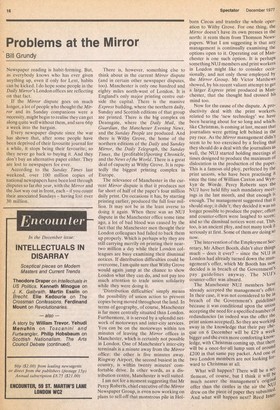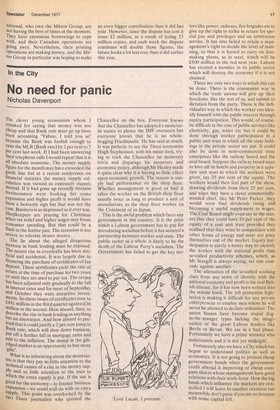Problems at the Mirror
Bill Grundy
Newspaper reading is habit-forming. But, as everybody knows who has ever given anything up, even if only for Lent, habits can be kicked. I do hope some people in the Daily Mirror's London offices are reflecting on that fact.
If the Mirror dispute goes on much longer, a lot of people v,vho thought the Mirror and its Sunday companions were a necessity, might begin to realise they can get along quite well without them, and save 66p a week into the bargain.
Every newspaper dispute since the war has shown that, after some people have been deprived of their favourite journal for a while, it stops being their favourite; so they never go back to buying it. And they don't buy an alternative paper either. They are lost to newspapers for ever.
According to the Sunday Times last weekend, over 100 million copies of national newspapers have been lost through disputes so far this year, with the Mirror and the Sun way out in front, each – if you count their associated Sundays 7 having lost over 30 million. There is, however, something else to think about in the current Mirror dispute (and in certain other newspaper disputes, too). Manchester is only one hundred and eighty miles north-west of London. It is England's only major printing centre outside the capital. There is the massive Express building, where the northern daily, Sunday and Scottish editions of that group are printed. There is the big complex on Deansgate, where the Daily Mail, the Guardian, the Manchester Evening News, and the Sunday People are produced. And there is Withy Grove, the home of the northern editions of the Daily and Sunday Mirror, the Daily Telegraph, the Sunday Times, the (profitable)Sporting Chronicle, and the News of the World. There is a great deal of capacity at Withy Grove. It is reputedly the biggest printing complex in Europe.
The relevance of Manchester in the curTent Mirror dispute is that it produces not far short of half of the paper's four million daily print. On occasions it has, by starting printing earlier, produced the full four million. It may not be in the least averse to doing it again. When there was an NUJ dispute in the Manchester office some time ago, a lot of bad blood was caused by the fact that the Manchester men thought their London colleagues had failed to back them up properly. Which is perhaps why they are still carrying merrily on printing their neartwo million a day while their London colleagues are busy examining their dismissal notices. If distribution difficulties could be overcome, I am quite sure that Withy Grove would again jump at the chance to show London what they can do, and not pay too much attention to trade union solidarity while they were doing it.
'Distribution difficulties' simply means the possibility of union action to prevent copies being moved throughout the land. In terms of geography, of course, Manchester is far more centrally situated than London. Furthermore, it is served by a splendid network of motorways and inter-city services. You can be on the motorways within ten minutes of leaving the Mirror offices in Manchester, which is certainly not possible in London. One of Manchester's inter-city terminals is a minute away from the Mirror office: the other is five minutes away. Ringway Airport, the second busiest in the country, is within twenty minutes' comfortable drive. In other words, as a distribution centre, Manchester is well suited.
I am not for a moment suggesting that Mr Percy Roberts, chief executive of the Mirror Newspaper Group, is even now working on plans to sell off that monstrous pile in Hol born Circus and transfer the whole operation to Withy Grove. For one thing, the Mirror doesn't have its own presses in the north: it rents them from Thomson Newspapers. What I am suggesting is that any management is continually examining the options open to it. Operating out of Manchester is one such option. It is perhaps something NUJ members and print workers in London might like to consider occasionally, and not only those employed by the Mirror .Group. Mr Victor Matthews showed, by his recent valiant attempt to get a larger Express print produced in Manchester, that the thought had crossed his mind too.
Now for the cause of the dispute. A productivity deal with the print workers, related to the 'new technology' we have been hearing about for so long and which, like Christmas, is coming at last, meant that journalists were getting left behind in the pay race. As the Mirror management didn't seem to be too exercised by a feeling that they should do a deal with the journalists as well, the NUJ started holding meetings at times designed to produce the maximum of dislocation in the production of the paper. This is a famous old ploy, perfected by the print unions, who have been practising it since the time of William Caxton and Wynkyn de Worde. Percy Roberts says the NUJ have held fifty such mandatory meetings in the last month, and that enough is enough. The management suggested that it should stop; it didn't; they decided it was no longer possible to produce the paper; offers and counter-offers were laughed to scorn; and so the dismissal notices went out. This, too, is an ancient ploy, and not many took it seriously at first. Some of them are doing se now.
The intervention of the Employment Secretary, Mr Albert Booth, didn't alter things much – does it ever? – since the NUJ in London had already turned down the management's offer, which Mr Booth has now decided is in breach of the Government's pay guidelines anyway. The NUJs counter-offer was absurd.
The Manchester NUJ members have already accepted the management's offer. In their case, it was not considered to be in breach of the Government's guidelines because it was conditional upon the union accepting the need for a specified number of redundancies (as indeed was the offer the print unions accepted). So they are working away in the knowledge that their pay chet: que on 6 December will be £29 a wee' bigger and the even more comforting knoW" ledge, with Christmas coming up, that there, will be a once-for-all lump sum of aroune £200 in that same pay packet. And one er two London members are not looking for ward to Christmas at all.
What will happen? There will be a set' tlernent, of course, but I think it will bei much nearer the management's origin offer than the castles in the air the NI),J. drew on the piece of paper they submitteu And what will happen next? Reed Inter national, who own the Mirror Group, are not having the best of times at the moment. They have enormous borrowings to cope With, and their Canadian operations are going awry. Nevertheless, their printing Operations are making money, and the Mirror Group in particular was hoping to make an even bigger contribution than it did last year. However, since the dispute has cost it some £2 million, as a result of losing 25 million copies, and each week the dispute continues will double those figures, the future looks a lot less rosy than it did earlier this year.











































 Previous page
Previous page